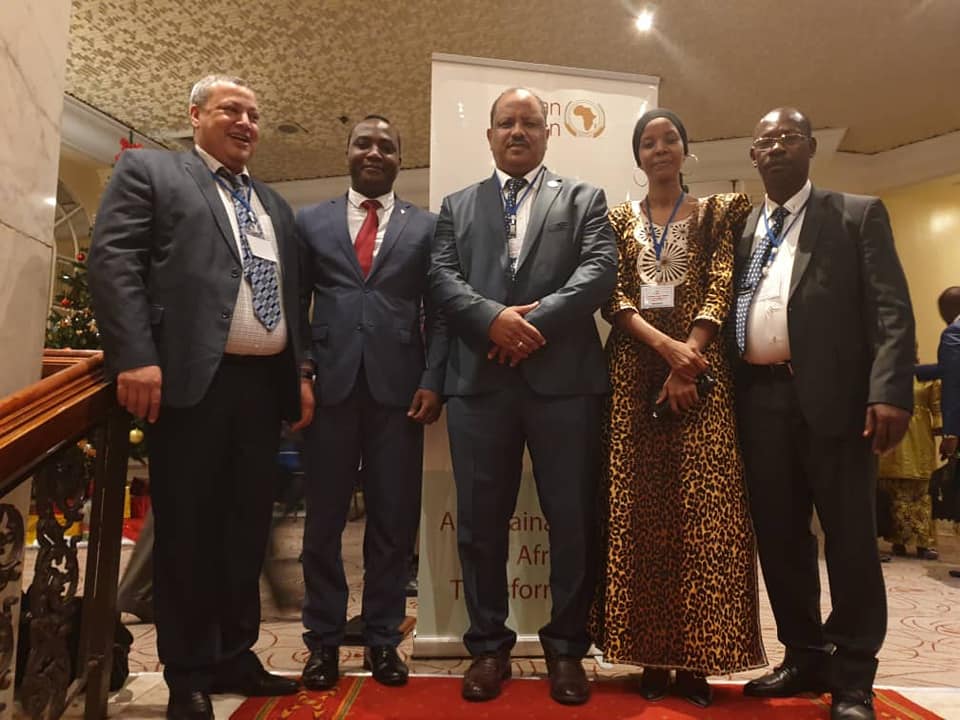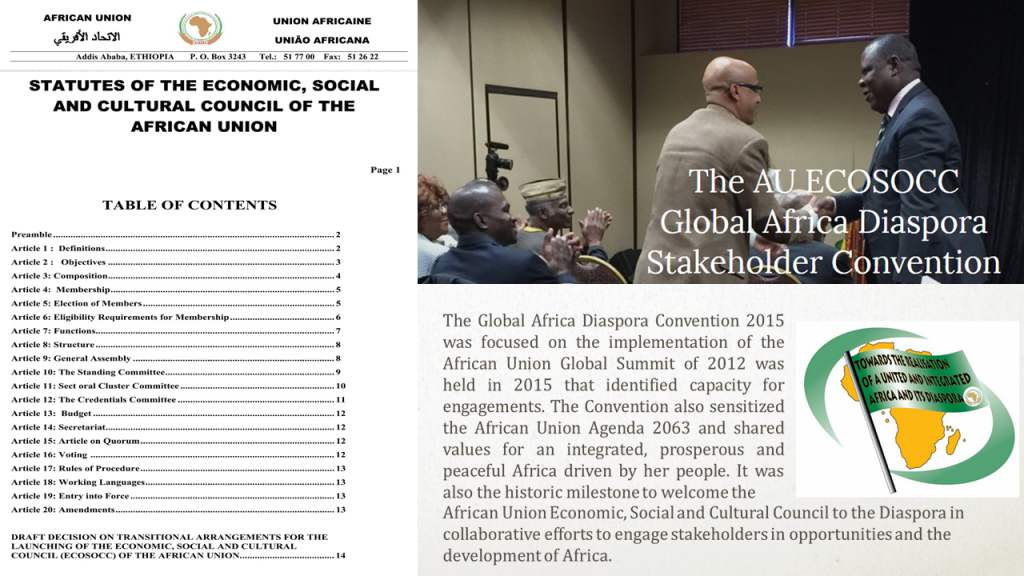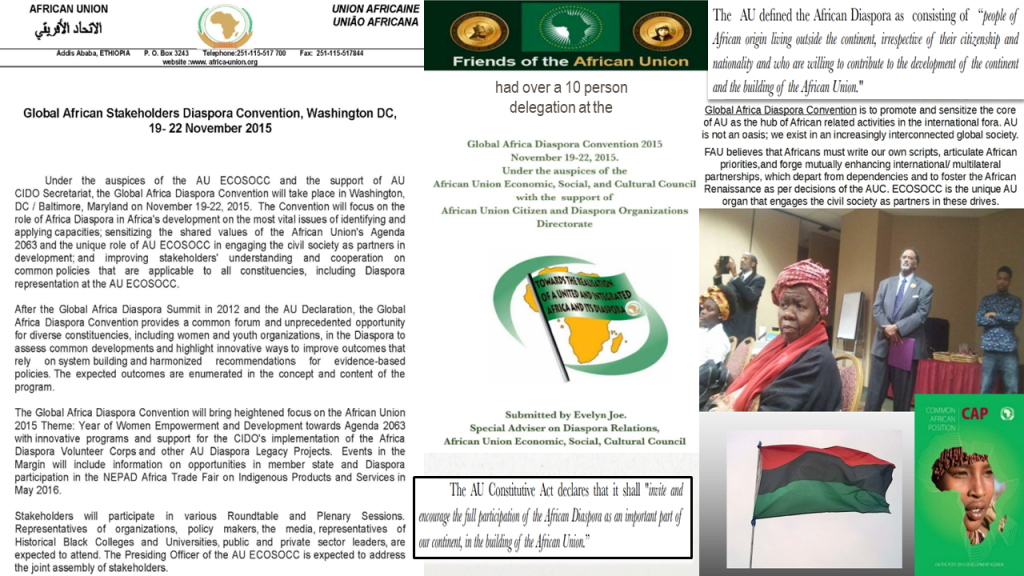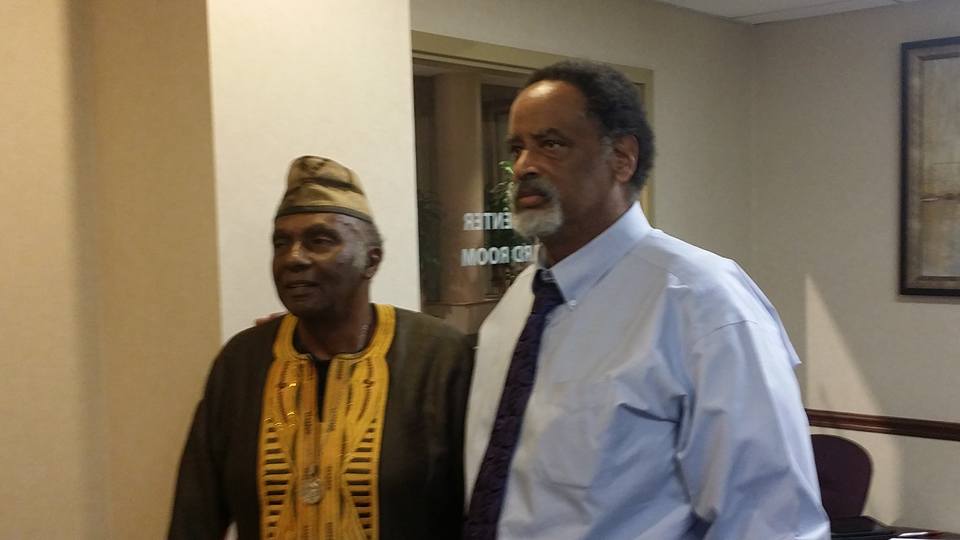The Economic, Social & Cultural Council (ECOSOCC) of the African Union (AU) elects new Bureau Members at the 3rd Permanent General Assembly
The Economic, Social & Cultural Council (ECOSOCC) of the African Union (AU) Third General Assembly was convened in line with Article 9(3) of the ECOSOCC Statutes, which requires the General Assembly to convene in Ordinary Session. The GA took place after the composite elections of Civil Society Organisations (CSOs) held on 8 December 2018, during which 72 new CSOs were elected into the 3rd GA. Over 240 CSOs from African countries that had submitted their application.
The Third General Assembly elected Mr. Abozer Elmana Elligai from Sudan as its new Presiding Officer. Mr Elmana is the Vice-president and co-founder of Maarij Foundation for Peace and Development (MFPD), an international non-governmental organization based in Sudan. The election took place on Tuesday 11 December 2018, during the 1st Ordinary Session of the 3rd Permanent General Assembly (GA) of ECOSOCC held in Nairobi, Kenya.
The new ECOSOCC Bureau members include a Presiding Officer and Four Deputy Presiding Officers from the five regions as follows:
- Presiding Officer – Mr. Abozer Elmana Elligai – (Sudan-Eastern Africa Region).
- Deputy Presiding Officer– Ms. Djibrine Amakher (Chad-Central Africa Region).
- Deputy Presiding Officer– Mr. Khalid Boudali (Morocco-Northern Africa Region).
- Deputy Presiding Officer– Mr. Patson Malisa – (South Africa-Southern African Region).
- Deputy Presiding Officer– Mr. Francis Akpa (Togo-Western Africa Region).

The elections of the new members of ECOSOCC as well as the Bureau were facilitated by the African Union’s Office of the Legal Counsel with the support of the Kenyan Electoral Commission. The process of the GA was facilitated by the Citizens and Diaspora Directorate (CIDO), in its capacity as ECOSOCC Secretariat with the support of other AUC Departments. Ninety-one (91) voters representing different African NGOs, took part in the election process.
ECOSOCC Mission
It is worth noting that ECOSOCC is an advisory body of the AU whose purpose as an organ in AU is to give civil society organizations a platform to contribute their input in the AU institutions and decision-making processes, in various projects and programmes. Specifically, it is to –
- Contribute, through advise, to the effective translation of the objectives, principles and policies of the Union into concrete programmes, as well as the evaluation of these programmes;
- Undertake studies that are recommended or deemed necessary by any other organ of the Union and submit recommendations accordingly;
- Carry out other studies as it deems necessary and submit recommendations as appropriate;
- Contribute to the promotion of popularization, popular participation, sharing of best practices and expertise, and to the realization of the vision and objectives of the Union;
- Contribute to the promotion of human rights, the rule of law, good governance, democratic principles, gender equality and child rights;
- Promote and support efforts of institutions engaged in review of the future of Africa and forge Pan-African values in order to enhance an African social model and way of life;
- Foster and consolidate partnership between the Union and CSOs through effective public enlightment, mobilization and feedback on the activities of the Union;
- Assume such other functions as may be referred to it by any other organ of the Union.
Article 11 of the Statutes of ECOSOCC stipulates that the Sectoral Cluster Committees (SCCs) are established as key operational mechanisms of ECOSOCC to formulate opinions and provide inputs into the policies and programmes of the African Union. The Committees are:
- Peace and Security;
- Political Affairs;
- Infrastructure and Energy;
- Social Affairs and Health;
- Human Resources, Science and Technology;
- Trade and Industry;
- Rural Economy and Agriculture;
- Economic Affairs;
- Women and Gender; and,
- Cross-Cutting Programmes (such as HIV/AIDS, international cooperation such as with the people of the historical African Diaspora and coordination with other AU institutions and organs).
AU ECOSOCC Background
On the occasion of its inauguration in Durban, South Africa in July 2002, the African Union embarked on a course to transform and integrate the Continent. The aims and aspirations of the new Union were a response to the calls for democracy and development from Africa’s vibrant civil society institutions. The Continent’s leaders were determined to build a Union that was people-oriented. Aware of the rich and diverse human and institutional resources at the grassroots level, the new Union, then, would be devoted to building strong partnerships between the governments and all segments of the society. The impulse is not for the African Union to organize civil society. Rather the organizing principle of the ECOSOCC of the African Union is one in which civil society would organize themselves to work with the Organization.
The distinctive character of the African Union’s ECOSOCC is that it is an opportunity for African civil society to play an active role in charting the future of the Continent, organizing itself in partnership with African governments to contribute to the principles, policies and programmes of the Union.
Established under the provisions of Articles 5 and 22 of the African Union’s Constitutive Act, ECOSOCC is the vehicle for building a strong partnership between governments and all segments of African civil society. The Statute of ECOSOCC, adopted by the Heads of State and Government at the Third Ordinary Session of the Assembly in July 2004 defines it as an advisory organ of the African Union composed of different social and professional groups of the Member States of the African Union [Assembly/AU/Dec.42 (III)].
These CSOs include but are not limited to the following: a)Social groups such as those representing women, children, the youth, the elderly and people with disability and special needs; b)Professional groups such as associations of artists, engineers, health practitioners, social workers, media, teachers, sport associations, legal professionals, social scientists, academia, business organizations, national chambers of commerce, workers, employers, industry and agriculture as well as other private sector interest groups; c)Non-governmental organizations (NGOs), community-based organizations (CBOs) and voluntary organizations; d) Cultural organizations and e) social and professional groups in the African Diaspora in accordance with the definition approved by the Executive Council.
Launch of the First Permanent General Assembly – Dar es Salaam, September 09th 2008, the African Union (AU) took a decisive step in its efforts to consolidate the institutional architecture of the Organization with the Launch of the Economic, social and Cultural Council of the Union (ECOSOCC) on 9 September 2008 in Dar es Salaam, Tanzania, President Jakaya Mrisho Kikwete, the Chair of the Union and President of the United Republic of Tanzania, presided over the event. In his keynote address at the launching, the Chair of the Union, President Kikwete noted that “with the establishment of ECOSOCC we are creating a people-oriented, people-centred and people-driven community in the African Union in which all stakeholders are effectively represented”. Moreover, he added “this event today has its uniqueness and significance in the annals of international organizations. This is the first time that an institution such as the African Union that began as an intergovernmental organization is incorporating non-state actors as full partners in the policy making process. In following this path, the African Union has gone beyond the mere processes of consultation that other institutions still adhere to. Africa therefore, has given the values of democratization and inclusiveness, a more holistic and enduring meaning and significance.”
Since the launching of the Permanent General Assembly in 2008, the challenges of ECOSOCC has been to build its own institutions, establish an appropriate format for partnering with other units and organs as it fulfills its main function of providing advisory opinions to the AU in close collaboration with cognate departments of the Commission. These are the issues that have engaged and continue to engage ECOSOCC as a young institution of the AU.
FAU actively participated during the Second Permanent General Assembly
The Second Permanent General Assembly was elected in December 2014 (Nairobi) and during this mandate, ECOSOCC has make significant progress especially with the activation of the Cluster Committees, developing of a Visual Corporate Identity ( with a new logo), improved communication channels ( social media & online platforms), production of advisory briefs and the development of its first Strategic Plan among others.
We led a delegation to this meeting in November 2015 –


RECALLING the objectives and principles enshrined in the Constitutive Act of the African Union;
ADDITIONALLY RECALLING the Protocol on Amendments to the Constitutive Act of the African Union adopted by the First Extra-Ordinary Session of the Assembly of Heads of State and Government in Addis Ababa, Ethiopia in January 2003, and in particular Article 3(q) which invites the African Diaspora to participate as an important component in the building of the African Union;
RECOGNIZING the need to build sustainable partnerships between the African continent and the African Diaspora through sustainable dialogue and effective collaboration with governments and peoples of different regions of the World in which the Diaspora populations are located;
COGNIZANT of the fact that culture and identity inform all facets of development;
ACKNOWLEDGING the need to celebrate and preserve the shared heritage between Africa and peoples of African descent in the Diaspora;
BEARING IN MIND that the African Diaspora represents a historical and evolving experience which calls for an approach that is sensitive to the specificities of the different regions;
AFFIRMING the need to promote South-South Cooperation as a framework for enhancing mutual development as well as Pan-African Solidarity;
REAFFIRMING the importance of women and youth as important pillars of our society that should be mainstreamed in all Diaspora discourses and actions;
LAUDING the efforts undertaken thus far to support Africa and African Diaspora process including organizational efforts, measures and strategies pursued by the African Union;
FURTHER RECALLING relevant African Union Decisions including Decision EX.CL/Dec. 5 (III) on the Development of the Diaspora Initiative adopted by the Third Ordinary Session of the Executive Council in Maputo, Mozambique, in July 2003, Decision EX.CL/Dec. 221 (VII) on the Africa-Diaspora Process adopted by the Eighth Ordinary Session of the Executive Council in January 2006 and Decision EX.CL/Dec. 406 (XII) on the First African Union Diaspora Ministerial Conference adopted by the Twelfth Ordinary Session of the Executive Council in Addis Ababa, Ethiopia, in January2008 on the modalities for Diaspora participation in the organs and activities of the Union and Decision Ass/AU/Dec.205(XI) adopted by the Eleventh Ordinary Session of the Assembly of the Union in Sharm El-Sheikh, Egypt, in July 2008 on the Africa Diaspora Summit, Decision, Ass/AU/Dec 354 (XVI) of the Sixteen Ordinary Session of the Assembly of the Union in Addis Ababa, Ethiopia in January 2011 on the Roadmap for the Diaspora Summit, including the convening of a Technical Experts meeting in Pretoria, South Africa in February 2011 and Decision Ass/AU/Dec 367 (XVII) of the Seventeenth Ordinary Session of Assembly of the Union on the convening of a second Ministerial Conference on the margins of the United Nations General Assembly in New York in September 2011 as well as Decision Assembly/AU/Dec. 393(XVIII) endorsing the outcome and conclusions of the Second Ministerial Conference held in New York in September 2011.
ACKNOWLEDGE of the importance to the African Diaspora of the establishment of The Economic, Social and Cultural Council (ECOSOCC) under the provision of Articles 5 and 22 of the Constitutive Act;
ACKNOWLEDGING ECOSOCC Statutes, adopted by the AU Assembly in July 2004, define it as an advisory organ composed of different social and professional groups of AU Member States (Assembly/AU/Dec.48 (III)). The first ECOSOCC General Assembly was formally launched on 9 September 2008 in Dar es Salaam, UR of Tanzania.
KNOWLEDGABLE of the Structure of ECOSOCC and that under article 4 of the ECOSOCC Statutes, the Council is composed of 150 CSOs: 1 two CSOs from each Member State; 10 CSOs operating at regional level and eight at continental level; 20 CSOs from the African Diaspora, as defined by the Executive Council and covering the continents of the world; and six CSOs, in ex-officio capacity, nominated by the AU Commission and based on special considerations, in consultation with Member States.
UNDERSTANDING that Article 4 also provides for Member State, regional, continental and Diaspora representatives to be elected on the basis of 50 percent gender equality and 50 percent aged between 18 and 35. Members are elected for four-year terms and may be re-elected once.
CONVINCED that popular participation in the activities of the African Union, as enunciated in the African Charter for Popular Participation, is a prerequisite for its success;
GUIDED by the common vision of a united and strong Africa and by the need to build a partnership between governments and all segments of civil society, in particular women, youth, the private sector and the African Diaspora, in order to strengthen solidarity and cohesion among our peoples;
RECALLING the decision of the Assembly to invite and encourage the full participation of the African Diaspora as an important part of the Continent, in the building of the African Union.
CONVINCED of the need to build on these efforts and outcomes as the basis for establishing a solid foundation for the rejuvenation of the global African family as an instrument of wider renaissance;
REALIZING the imperative of a sustained and coordinated approach and ownership of the African Diaspora related programmes and projects so as to promote their effective implementation and impact;
COMMIT to cooperate in the political, economic and social areas outlined in this Report of the Global African Stakeholders Convention and Programme of Action, and implementation and follow-up modalities.
EXPRESSING our appreciation to Head of Secretariat Dr. Jinmi Adisa for his support in holding the Global African Diaspora Stakeholders Convention.
FUTHERMORE RECOGNIZING that the work of adviser on Diaspora Relations Ms Evelyn Joe in carrying out creation of the the Global African Diaspora Stakeholders Convention and recognition of her skills and outstanding quality of advise and her expressed commitment to the integration and development agenda of Africa and the African Union.
THEREBY at this the Global African Diaspora Stakeholders Convention we agree to adopt, develop and report on the implement the five legacy projects as created in South Africa 25 May 2012 at the first African Diaspora Summit as a way of giving practical meaning to the Diaspora programme and in order to facilitate the post-Summit implementation programme. These are: a) the production of a Skills Database of African Professionals in the Diaspora; b) the establishment of the African Diaspora Volunteers Corps; c) the African Diaspora Investment Fund; d) a programme on the Development Marketplace for the Diaspora, as a framework for facilitating innovation and entrepreneurship among African and Diaspora; and e) The African Remittances Institute.
AGREEMENT between the people of the African Diaspora and ECOSOCC in regards to decisions to the five tasks given unto us the people of Africa in the sixth region, as defined by AU document, on this day November 21st 2015, do hereby give this report to the leadership of the African Union.
1. We have implemented phase I of the task to create the African Diaspora Volunteer Corps at au6.global with the African Civil Society Organizations (CSO). CSO members include but are not limited to:
• Social groups such as those representing women, children, youth, the elderly and people with disabilities and special needs
• Professional groups such as associations of artists, engineers, health practitioners, social workers, media, teachers, sport associations, legal professionals, social scientists, academia, business organisations, national chambers of commerce, workers, employers, industry and agriculture, as well as other private sector interest groups
• Non-governmental organisations (NGOs), community-based organisations (CBOs) and voluntary organisations
• Cultural organisations
• Social and professional organisations in the African Diaspora (in accordance with the definition approved by the Executive Council of ECOSOCC).
2. We have created a African Diaspora Skills Database Phase I which is used in the creation of the African Diaspora Volunteer Corps so as to encourage and support the development of an African Union Diaspora Volunteer programme as a framework for associating the Diaspora directly with the development of the continent and which as of this day is in operation at AU6.global.
3. We have created this day the framework for a report to be issued by May 25th 2016 on the African Institute of Remittance based on previous actions of the African Diaspora and organs and officials of the African Union since July 16 2012.
4. We have created this day the framework for a African Investment Fund based on previous actions since July 16 2012 and the business model of the Community Reinvestment Fund which shall serve as a guide in the creation of a global organized with a ownership structure that supports the people of the African Union.
5. We Africans of the Diaspora acknowledge that under Article 11 of the ECOSOCC Statutes there is established 10 Sectoral Cluster Committees as key operational mechanisms to formulate opinions and provide input into AU policies and programmes. The Committees are: Peace and Security; Political Affairs; Infrastructure and Energy; Social Affairs and Health; Human Resources, Science and Technology; Trade and Industry; Rural Economy and Agriculture; Economic Affairs; Women and Gender; and Cross-Cutting Programmes (such as HIV/AIDS, international cooperation and coordination with other AU institutions and organs). The ECOSOCC General Assembly may recommend amendments to the established Sectoral Cluster Committees. We will endeavor have implemented preliminary work on the task to create the Development of a marketplace for African development in line with ECOSOCC Statues and shall report back to assembly not later than May 25th 2016 on the basis of the aforementioned 10 Sectoral Cluster Committees .
We do this work so as to encourage the Diaspora to organize our self in a global network and to establish appropriate mechanisms that will enable our increasing participation in the affairs of the African Union as observers and eventually, in the future, as a sixth region of the continent that would contribute substantially to the implementation of policies and programmes.
Acknowledge the responsibility of the African Diaspora to fund and host rotational AU Diaspora Conference in Africa and in the Diaspora to review the implementation of this Programme of Action.
So we sign as CSO’s and or their representatives
FRiends of the African Union
New Future Foundation
So we sign as Individuals
